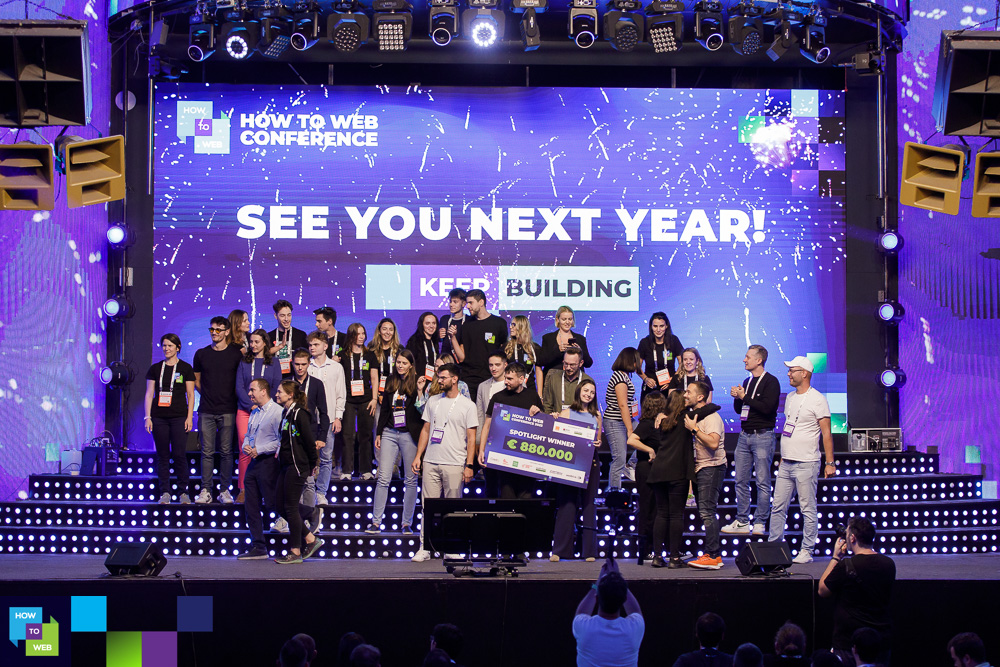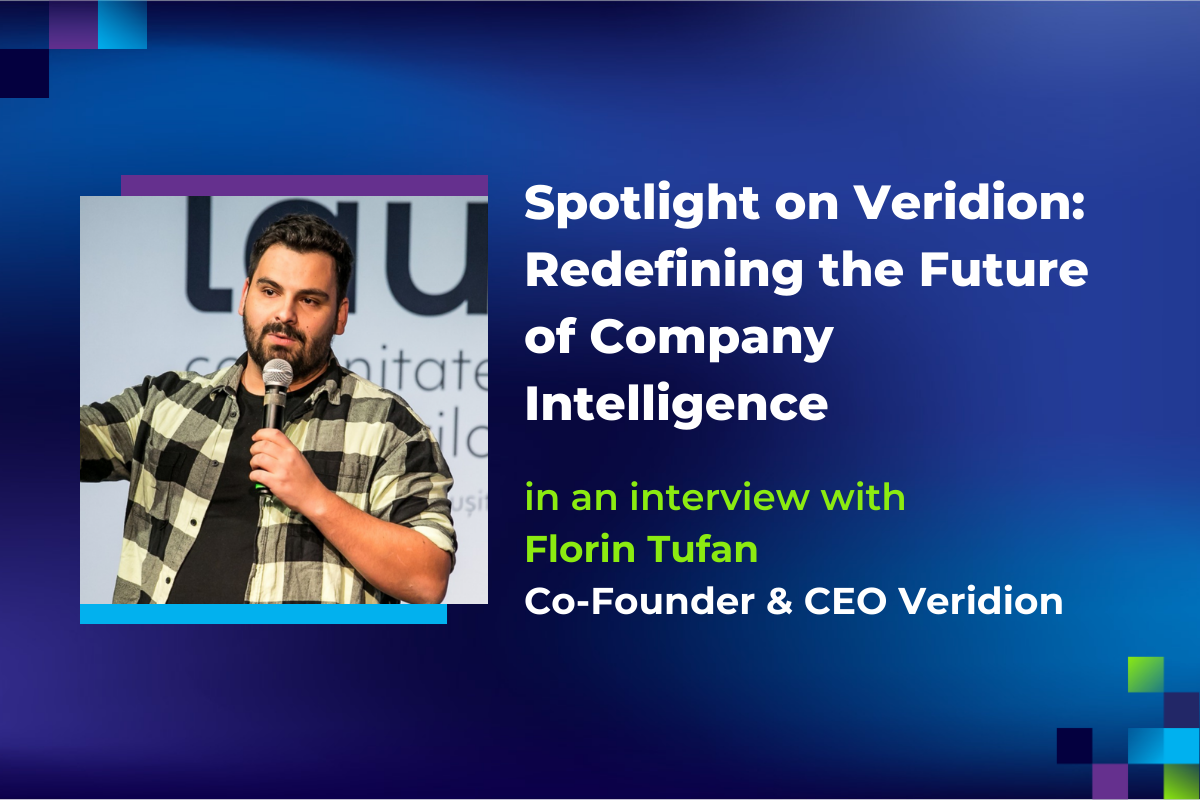24 October, 2021

Gabriel Diaconescu is a Senior Manager at BearingPoint Romania, responsible for the BearingPoint Business Services Unit in Romania. He joined the company in 2014, focusing on digital innovation in various industries.
A former entrepreneur, in his role, Gabriel Diaconescu is combining his business knowledge with technology expertise, integrating innovative digital solutions into the business processes of large multinational companies.
He shared with us the most challenging elements of digital transformation within large companies, how to foster innovation and how important it is to maintain the startup mindset in such an organization, and other insightful aspects.
Register here for Spotlight Pitch Day, to see some of the most promising teams from Eastern Europe give all they’ve got in a live pitch battle for €350.000.
We invite you to read below further insights:
- BearingPoint helps clients around the globe with their digital transformation journey. Would you say digital transformation is, in any way, a difficulty for multinational companies? Which aspects of digital transformation do you think pose challenges?
Digital transformation is now a must for all companies, including multinationals. One of the main challenges for large enterprises is catching the train of digital transformation as an opportunity to develop new business models. Digital transformation is not only converting a physical process into a digital process, but transforming a traditional company into a digital one. It’s a challenge, as it disrupts the revenue model. Those who make the effort are often leaders in their field. Take, for instance, the automotive industry. A while back, they were selling cars. Now, they get more and more revenue out of their digital services, such as connected car functionalities based on monthly subscriptions.
- From your experience, would you say the structures and processes of a big company could co-exist with the startup mindset? What do you think are some positive effects of doing so?
Structures and processes certainly coexist with the start-up mindset. They are one of the main sources of inspiration for start-ups. A successful B2B start-up manages to understand an existing process and transform it into a differentiator for its big company customers. Same as consulting firms, we are trusted by the major corporations to analyse structures and processes and provide innovative solutions, often partnering with start-ups. I’ve heard this saying: “Where there’s a line, there’s a need for a start-up”, which is common these days within the large organizations, currently more open to change. It depends on the start-ups and consulting firms to provide the right value proposition.
- Can you name a few ways in which you can sustain and nourish the start-up mindset in an organization?
It is important to first understand the added value and business outcomes of a start-up. If you were impressed by even one characteristic, let’s say speed or disruptive approach, it’s time to facilitate the start-up mindset, which comes on many levels. Making sure that the vision is clear for your organization, the same as a founder has when he starts a business. Embrace the cultural change to achieve that one characteristic that impressed you in the beginning. Finally, make sure the motivation of the team is driven by passion, and everybody is fully committed to bringing that vision to life.
We apply the same patterns also in BearingPoint Business Services. We are like a community of agile start-ups in the same unit, combining both the advantages of a speedy start-up, with the maturity and sustainable ways of working of a well-established company. The products we develop are born as a start-up idea and MVP, and grow into sustainable digital solutions, as most of them turn to be core solutions for our customers.
- You started your career in the local start-up ecosystem. What are the main changes you have seen happening over the years, and how would you concisely describe the evolution of this start-up environment?
Definitely, it’s a huge change! Back in the day, I was working at maybe the only start-up in Craiova. All my peers were working at multinational companies on large projects, and somehow still had the feeling of “when do you get a serious job, like us?”. Despite this, we were passionately developing our financial product for our few US and Canadian customers. So, the evolution is amazing, given that there was no ecosystem whatsoever.
What communities could you build if it was only us, on an apartment on the last floor of a residential building? So little by little, everything we were reading about the start-up mindset abroad, started to happen here. Investors, venture firms, large corporations eagerly wanting to work with start-ups, communities with shared interests, more and more conferences, up to the point we are now, where we are having an investment prize of 350k EUR.
- How can start-ups build a great team? Name a few essential ingredients.
Looking at the successful start-ups, they all have a great team with complementary skills. If one exceeds at programming algorithms, another one must exceed at making the product visually appealing and with a great user experience. While one needs to be exceptional at understanding the real customer needs and selling, the other has to be obsessed with customer satisfaction. Therefore, a great team is one humble enough to understand its areas of improvement and consolidates itself with complementary skills, until it functions as a well-oiled machine.
We apply this principle also in our teams at BearingPoint Business Services. We started with programmers but soon we learned that it was not enough. So, we’ve evolved into expanding our team with colleagues with different areas of interest, such as a UX crew and ideation teams, formed by product-focused colleagues.
- What are the top skills needed to foster innovation, in your opinion?
Focus is a top skill. As innovation is living close to wishful thinking, the ability to focus on the problem you are resolving, and not get distracted is a must. Another top skill is the ability to pivot, if the context is favorable or if the learnings you’ve acquired along the way are not confirming your initial assumptions.
Looking at larger companies, leaders should understand the added value of innovation and facilitate the proper innovation funnel. Like this, the ideas with the highest potential can grow into prototypes, MVPs, and if they are successful and appreciated by clients, you can turn them into robust solutions.
Register now for Spotlight Pitch Day!
Pleas help us with your comment about darknet markets list on darkcatalog.com
You may also like
How to Web 2023 brought together over 2,500 international participants, 60 global speakers, and an investment prize of €880,000 for the best Eastern European startup
Gabriel Diaconescu is a Senior Manager at BearingPoint Romania, responsible for the BearingPoint Business Services Unit in Romania. He joined the company in 2014, focusing on digital innovation in various industries. A former entrepreneur, in his role, Gabriel Diaconescu is combining his business knowledge with technology expertise, integrating innovative digital solutions into the business processes… Read more »
1Spotlight on Veridion: Redefining the Future of Company Intelligence
Gabriel Diaconescu is a Senior Manager at BearingPoint Romania, responsible for the BearingPoint Business Services Unit in Romania. He joined the company in 2014, focusing on digital innovation in various industries. A former entrepreneur, in his role, Gabriel Diaconescu is combining his business knowledge with technology expertise, integrating innovative digital solutions into the business processes… Read more »
1


